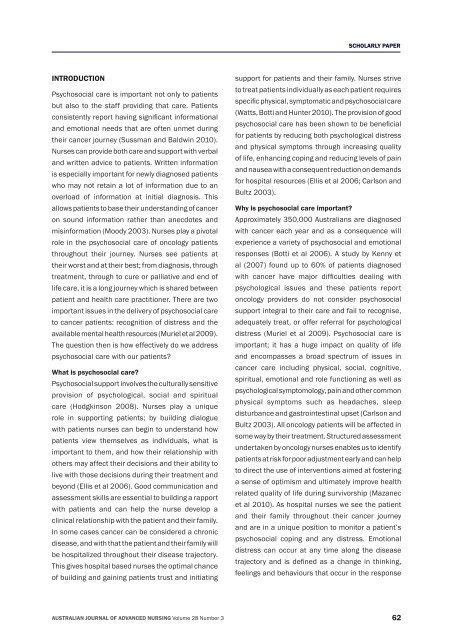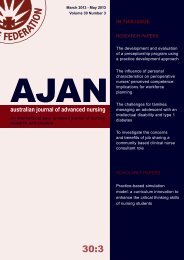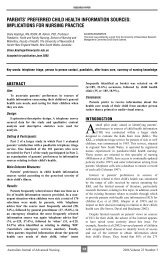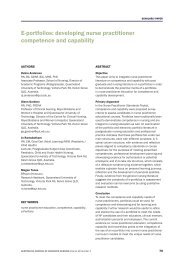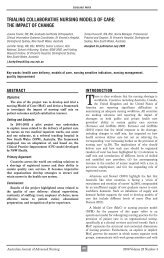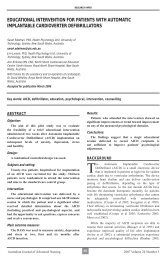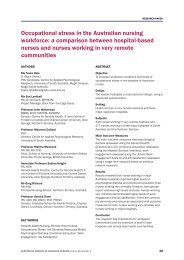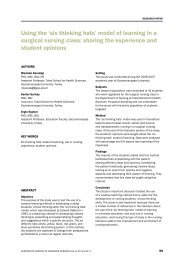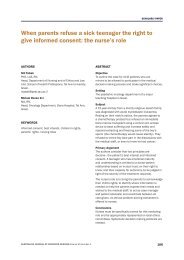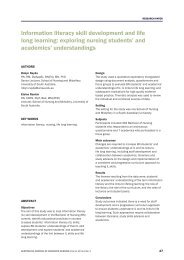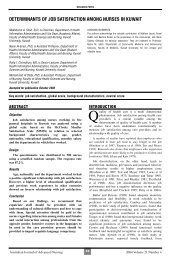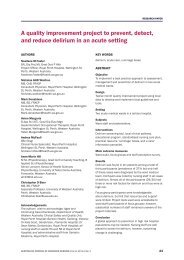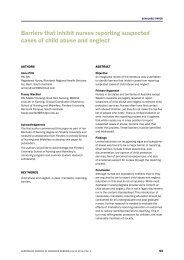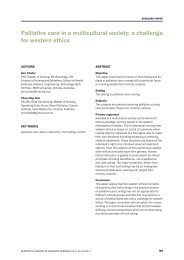australian journal of advanced nursing
australian journal of advanced nursing
australian journal of advanced nursing
You also want an ePaper? Increase the reach of your titles
YUMPU automatically turns print PDFs into web optimized ePapers that Google loves.
INTRODUCTION<br />
Psychosocial care is important not only to patients<br />
but also to the staff providing that care. Patients<br />
consistently report having significant informational<br />
and emotional needs that are <strong>of</strong>ten unmet during<br />
their cancer journey (Sussman and Baldwin 2010).<br />
Nurses can provide both care and support with verbal<br />
and written advice to patients. Written information<br />
is especially important for newly diagnosed patients<br />
who may not retain a lot <strong>of</strong> information due to an<br />
overload <strong>of</strong> information at initial diagnosis. This<br />
allows patients to base their understanding <strong>of</strong> cancer<br />
on sound information rather than anecdotes and<br />
misinformation (Moody 2003). Nurses play a pivotal<br />
role in the psychosocial care <strong>of</strong> oncology patients<br />
throughout their journey. Nurses see patients at<br />
their worst and at their best; from diagnosis, through<br />
treatment, through to cure or palliative and end <strong>of</strong><br />
life care, it is a long journey which is shared between<br />
patient and health care practitioner. There are two<br />
important issues in the delivery <strong>of</strong> psychosocial care<br />
to cancer patients: recognition <strong>of</strong> distress and the<br />
available mental health resources (Muriel et al 2009).<br />
The question then is how effectively do we address<br />
psychosocial care with our patients?<br />
What is psychosocial care?<br />
Psychosocial support involves the culturally sensitive<br />
provision <strong>of</strong> psychological, social and spiritual<br />
care (Hodgkinson 2008). Nurses play a unique<br />
role in supporting patients; by building dialogue<br />
with patients nurses can begin to understand how<br />
patients view themselves as individuals, what is<br />
important to them, and how their relationship with<br />
others may affect their decisions and their ability to<br />
live with those decisions during their treatment and<br />
beyond (Ellis et al 2006). Good communication and<br />
assessment skills are essential to building a rapport<br />
with patients and can help the nurse develop a<br />
clinical relationship with the patient and their family.<br />
In some cases cancer can be considered a chronic<br />
disease, and with that the patient and their family will<br />
be hospitalized throughout their disease trajectory.<br />
This gives hospital based nurses the optimal chance<br />
<strong>of</strong> building and gaining patients trust and initiating<br />
SCHOLARLY PAPER<br />
support for patients and their family. Nurses strive<br />
to treat patients individually as each patient requires<br />
specific physical, symptomatic and psychosocial care<br />
(Watts, Botti and Hunter 2010). The provision <strong>of</strong> good<br />
psychosocial care has been shown to be beneficial<br />
for patients by reducing both psychological distress<br />
and physical symptoms through increasing quality<br />
<strong>of</strong> life, enhancing coping and reducing levels <strong>of</strong> pain<br />
and nausea with a consequent reduction on demands<br />
for hospital resources (Ellis et al 2006; Carlson and<br />
Bultz 2003).<br />
Why is psychosocial care important?<br />
Approximately 350,000 Australians are diagnosed<br />
with cancer each year and as a consequence will<br />
experience a variety <strong>of</strong> psychosocial and emotional<br />
responses (Botti et al 2006). A study by Kenny et<br />
al (2007) found up to 60% <strong>of</strong> patients diagnosed<br />
with cancer have major difficulties dealing with<br />
psychological issues and these patients report<br />
oncology providers do not consider psychosocial<br />
support integral to their care and fail to recognise,<br />
adequately treat, or <strong>of</strong>fer referral for psychological<br />
distress (Muriel et al 2009). Psychosocial care is<br />
important; it has a huge impact on quality <strong>of</strong> life<br />
and encompasses a broad spectrum <strong>of</strong> issues in<br />
cancer care including physical, social, cognitive,<br />
spiritual, emotional and role functioning as well as<br />
psychological symptomology, pain and other common<br />
physical symptoms such as headaches, sleep<br />
disturbance and gastrointestinal upset (Carlson and<br />
Bultz 2003). All oncology patients will be affected in<br />
some way by their treatment. Structured assessment<br />
undertaken by oncology nurses enables us to identify<br />
patients at risk for poor adjustment early and can help<br />
to direct the use <strong>of</strong> interventions aimed at fostering<br />
a sense <strong>of</strong> optimism and ultimately improve health<br />
related quality <strong>of</strong> life during survivorship (Mazanec<br />
et al 2010). As hospital nurses we see the patient<br />
and their family throughout their cancer journey<br />
and are in a unique position to monitor a patient’s<br />
psychosocial coping and any distress. Emotional<br />
distress can occur at any time along the disease<br />
trajectory and is defined as a change in thinking,<br />
feelings and behaviours that occur in the response<br />
AUSTRALIAN JOURNAL OF ADVANCED NURSING Volume 28 Number 3 62


